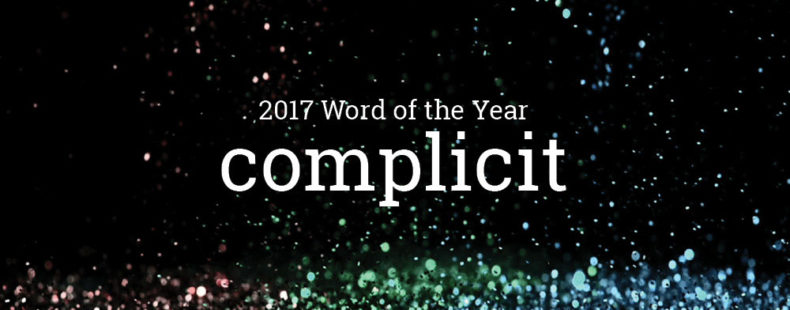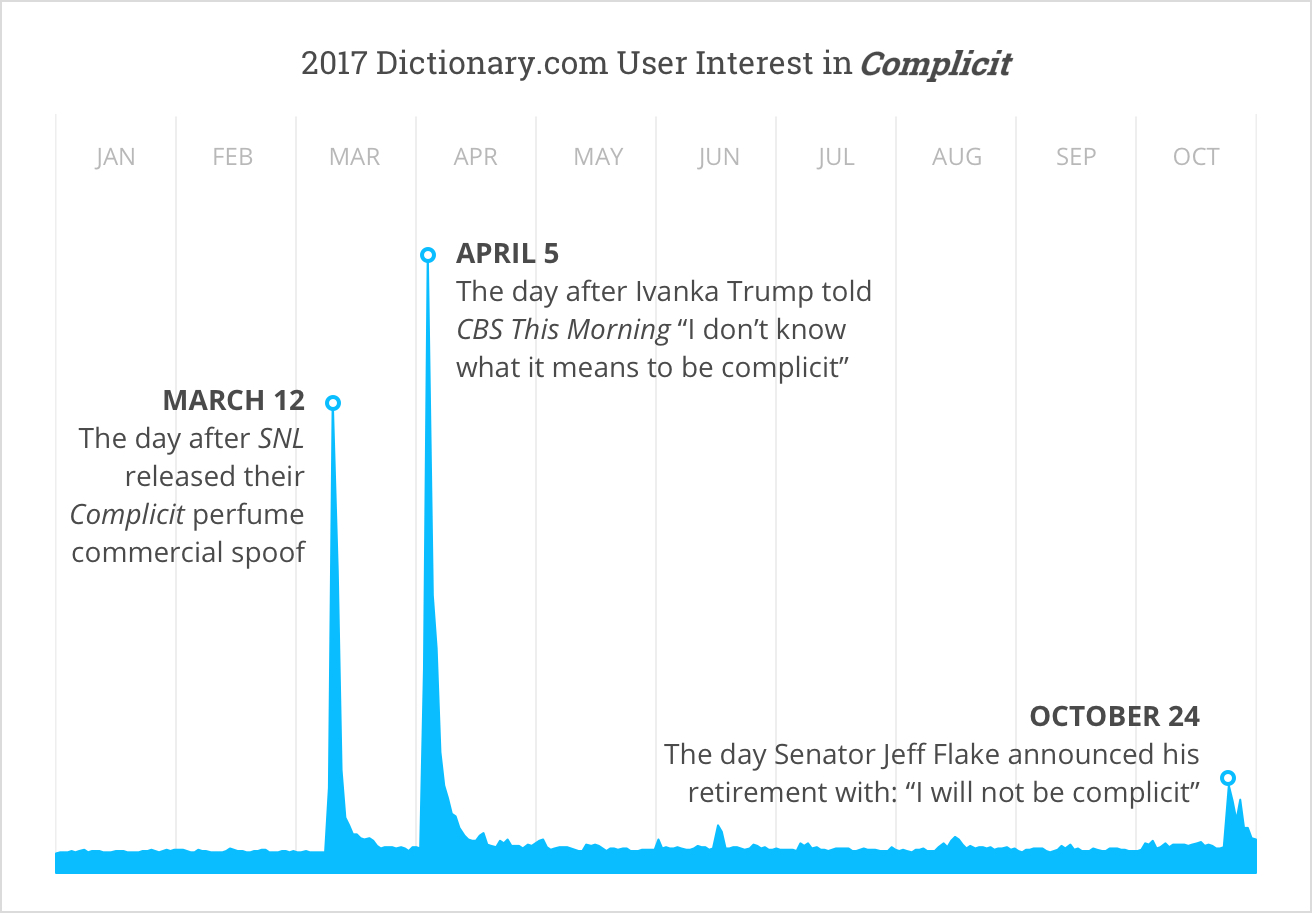Don’t be caught not knowing the 2020 Word of the Year. Find out what it is here!
As 2017 comes to a close, it’s time for us to reflect on the words that impacted all of us this year—for better or for worse. At Dictionary.com, the Word of the Year serves as a symbol of the year’s most meaningful events and lookup trends.
WATCH: These Are The Words That Defined 2017
Our 2017 Word of the Year is complicit.
Complicit means “choosing to be involved in an illegal or questionable act, especially with others; having partnership or involvement in wrongdoing.” Or, put simply, it means being, at some level, responsible for something . . . even if indirectly.
See all of our past Word of the Year selections here.
The word complicit has sprung up in conversations this year about those who speak out against powerful figures and institutions and about those who stay silent. As we look at the cultural and political landscape, we ask: “What does it mean to be complicit in 2017?”
“I don’t know what it means to be complicit”
When the meaning of words is called into question, people turn to Dictionary.com as a source of truth. Traces of that quest for truth show up in our trending lookup data.
The first spike in searches for complicit was on March 12, with a 10,000% increase in daily average lookups. This was the day after Saturday Night Live aired their satirical ad featuring Scarlett Johansson playing Ivanka Trump, hawking a perfume called Complicit. This scent was marketed as “The fragrance for the woman who could stop all this, but won’t.”
The largest increase in lookups for complicit this year (up over 11,000%) was on April 5. This time, the spike followed an interview with the real Ivanka Trump in which she attempted to redefine complicit. When asked by CBS This Morning’s Gayle King about accusations that she and her husband Jared Kushner are complicit in the actions of her father, Ivanka Trump responded: “If being complicit is wanting to be a force for good and to make a positive impact, then I’m complicit.”
As many of you know from looking up the definition of complicit, there’s nothing positive or good about it. In fact, being complicit is decidedly negative, as it means that a person is involved with someone or something that’s wrong. Whatever your politics, this meaning is not up for debate. Ivanka Trump herself capped off her own personal definition of complicit with “I don’t know what it means to be complicit.”
Climate change is real
Climate change has been thrust into the spotlight this year with President Trump’s decision to withdraw the US from the Paris Climate Agreement. Additionally, the new EPA chief Scott Pruitt has been complicit in his refusal to acknowledge that humans play a primary role in climate change. And, we can’t forget that information on climate change was removed from the government’s website this year, as well.
This year, displays of extreme weather have made us all more aware of the widespread destruction that climate change can wreak. Rightfully so, the terms climate change, global warming, and carbon dioxide all showed up in our trending searches this year.
Power and sexual assault
This year, allegations of sexual assault were made against several powerful men, resulting in the resignation and firing of people in positions of authority across multiple industries. Numerous women spoke out against former film executive Harvey Weinstein, in particular, which inspired other survivors of assault to come forward with their own stories. These powerful men could not have harmed so many people for so many years without the complicity of their associates and the established practice of “turning a blind eye” to misconduct.
The wrong side of history
President Trump’s statement following the events in Charlottesville in August, in which he said “both sides” were to blame, showed his complicity with ideologies that promote hate, especially directed toward marginalized groups. The events in Charlottesville caused lookups for white supremacist, nazi, neo-nazi, anti-fascist, and antifa to trend in our data.
Social media as a propaganda platform
In late October, Google, Facebook, and Twitter testified in front of congress about online content created and circulated by Russian operatives with the purpose of meddling in the 2016 US presidential election. Officials from each of these companies swore in before the Senate Judiciary Committee’s Crime and Terrorism Subcommittee for questioning about political ads sold to Russian trolls. The subcommittee chipped away at the question of how these companies (with the top technological resources in the world) could allow this to happen. To what extent are these companies complicit in the propagation of propaganda, fake news, and disinformation? The answer is extremely nuanced and still up for debate, but just raising the question is an important first step.
Refusal to be complicit
We chose our Word of the Year, in part, because of noteworthy stories of those who have refused to be complicit. In the face of oppression and wrongdoing, this refusal to be complicit has been a grounding force of 2017:
- We saw an estimated five million people participate in the the worldwide Women’s March on January 21
- We saw NFL quarterback Colin Kaepernick’s 2016 protest against systemic injustices gain even more traction in response to President Trump calling for players who kneel during the National Anthem to be fired or suspended
- We saw women, as well as people of all genders, come forward with personal stories of sexual harassment and assault with the hashtag #metoo
- We saw high-profile resignations from the Trump Administration, perhaps most memorably from the Arts Council, who submitted their letter of resignation in the form of an acrostic spelling of the word RESIST
In fact, the third biggest spike in searches for the word complicit was in response to this refusal to be complicit. It happened on October 24 when Arizona Senator Jeff Flake (who has voted in line with President Trump’s position 90% of the time according to FiveThirtyEight) announced his retirement saying “I have children and grandchildren to answer to, and so, Mr. President, I will not be complicit.” He urged fellow Republicans to speak out because “silence can equal complicity.”
So, why complicit?
This year has seen a real awakening to complicity in various sectors of society, from politics to pop culture.
As we do the hard work of processing what this all means, we must examine our own behavior and ask ourselves some difficult questions. Could I have spoken out in the past . . . and didn’t? Did I go along with something because it was the path of least resistance?
Silence does not always equal complicity. We also must consider the very real reasons why we choose not to speak out. This includes fear of retaliation, fear of endangering one’s safety or the safety of loved ones, or knowledge that nothing will change. Silence may come from a place of self-preservation. Those whose lives have been negatively impacted by assault or violence or social injustices don’t owe their stories to anyone. It’s important to remember that sometimes speaking out is a privilege in itself.
Our choice for Word of the Year is as much about what is visible as it is about what is not. It’s a word that reminds us that even inaction is a type of action. The silent acceptance of wrongdoing is how we’ve gotten to this point. We must not let this continue to be the norm. If we do, then we are all complicit.













